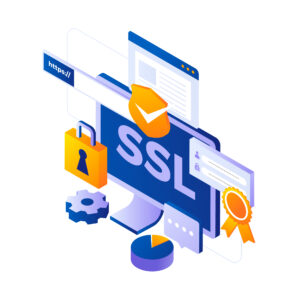Blog
SSL for Websites – The Key to Trust and Security Online

In today’s digital age, where online interactions and transactions have become the norm, ensuring the security and trustworthiness of websites is of paramount importance. Enter SSL certificates into websites – the digital guardians that stand between your website and potential threats, elevating your Google ranking, bolstering security, and instilling confidence in your visitors. In this comprehensive guide, we will delve into the world of SSL certificates for websites, unveiling their multifaceted benefits for your online presence.
I. Introduction
In a world where cyber threats loom large and users demand seamless security, SSL certificates for any website have risen to the forefront as indispensable tools for websites. These certificates play a major role in not only boosting Google rankings but also fostering trust among users.
II. What is SSL important for websites & How Does it Work?
At its core, SSL for websites, or Secure Sockets Layer, is a protocol that encrypts the communication between a website and its visitors. This encryption ensures that sensitive data, such as personal information and financial details, is transformed into an indecipherable code while in transit. By acting as a digital bodyguard, SSL certificates thwart malicious attempts at data theft or interception.

III. The Impact of SSL for Websites on Google Ranking
Google, the digital gatekeeper of information, values user security above all. Consequently, SSL certificates for websites have emerged as a key criterion for its ranking algorithm. Websites that implement SSL encryption are rewarded with higher search engine rankings, granting them greater visibility and prominence. The adoption of HTTPS, the secure version of HTTP, acts as a beacon to Google, indicating that your website is a safe harbor for users.
IV. The Role of SSL in Building Trust with Websites Visitors
Trust is the cornerstone of successful online interactions. SSL certificates don’t merely safeguard data; they forge a connection of trust between your website and its visitors. With SSL in place, users witness the padlock icon in the address bar, signifying a secure environment. This subtle visual cue speaks volumes about your commitment to their security and privacy.
V. SSL and Websites Security
The digital landscape is rife with threats like data breaches and man-in-the-middle attacks. SSL certificates act as a formidable defense, ensuring that the sensitive information exchanged between users and your website remains confidential. With SSL in place, the chances of cybercriminals intercepting and deciphering data are dramatically reduced, providing comprehensive security to your website and its visitors.
VI. SSL and Customer Data Protection
Businesses entrusted with user data carry a sacred responsibility. SSL certificates offer a robust shield, safeguarding customer data during transactions and interactions. This level of protection aligns seamlessly with data protection regulations like GDPR, illustrating your dedication to compliance and safeguarding user information.
VII. Choosing the Right SSL Certificate for Your Business
As businesses vary in size and nature, so do their SSL needs. There are three primary types of SSL certificates: Domain Validation (DV), Organization Validation (OV), and Extended Validation (EV). Each caters to a specific set of requirements, with EV certificates providing the highest level of validation. Selecting the right certificate for your business hinges on understanding your security needs and priorities.
VIII. How Business Web Hosting Providers Support SSL Implementation
Implementing SSL can be a daunting task for the uninitiated. This is where reputable business web hosting providers step in. Many hosting companies now offer SSL certificates as part of their hosting packages, simplifying the process and making it accessible even for non-technical users.
IX. SSL and Mobile-First Indexing
With the rise of mobile devices as primary browsing tools, Google’s mobile-first indexing has taken center stage. SSL certificates are pivotal in this mobile-centric landscape. Not only do they enhance mobile SEO, but they also ensure a seamless, secure experience for users on smartphones and tablets.
X. The Process of Installing and Configuring SSL
Implementing SSL might seem like a complex endeavor, but it can be broken down into manageable steps. From selecting the right SSL certificate to configuring it on your server, our step-by-step guide will provide you with the insights and guidance you need for a seamless implementation.
XI. The Importance of SSL Renewals and Maintenance
As with all things digital, SSL certificates have a lifespan. It’s imperative to renew them before expiration to maintain the high level of security and trust they provide. Additionally, regular maintenance and updates are essential to stay ahead of evolving security threats.
XII. Real-Life Examples of SSL Success Stories
The impact of SSL certificates is best understood through real-world success stories. Businesses that have embraced SSL have not only witnessed improved Google rankings but have also enjoyed enhanced customer trust and fortified security. These stories stand as testaments to the power of SSL certificates.
XIII. Conclusion
In an era where cyber threats abound and user trust is paramount, SSL certificates stand as the linchpin of online security. From boosting Google rankings to fostering trust and protecting customer data, the benefits of SSL certificates are multifaceted and far-reaching. It’s incumbent upon businesses to prioritize SSL implementation and invest in reputable hosting to ensure their websites remain secure, trustworthy, and poised for success in the digital realm. By embracing SSL, you’re not just encrypting data – you’re encrypting the future of your online presence.

